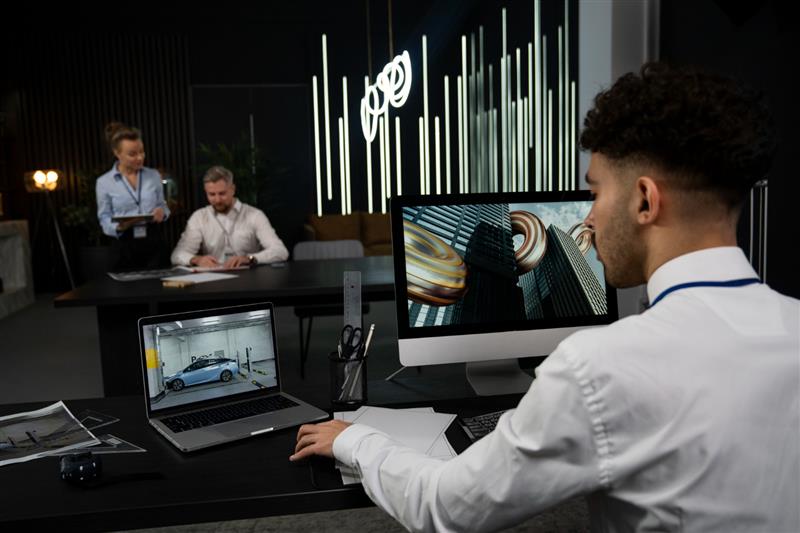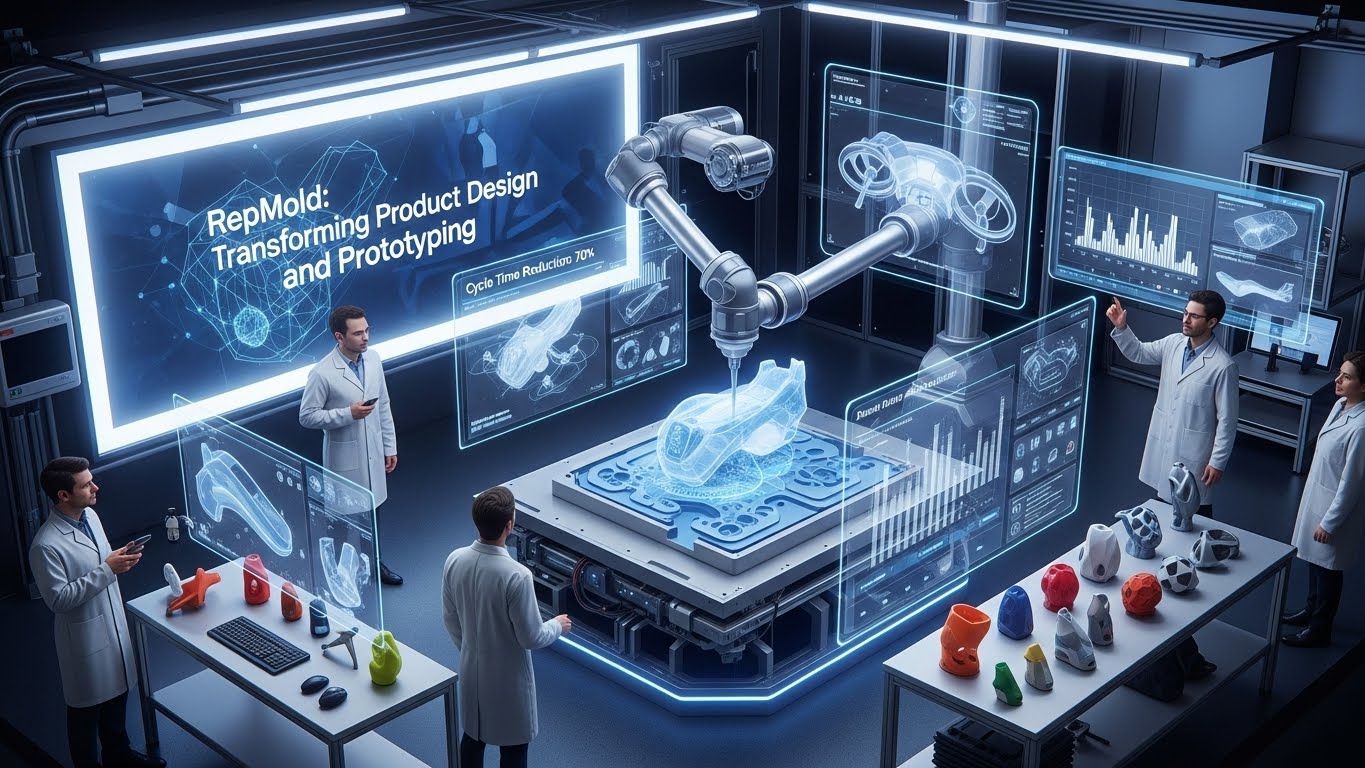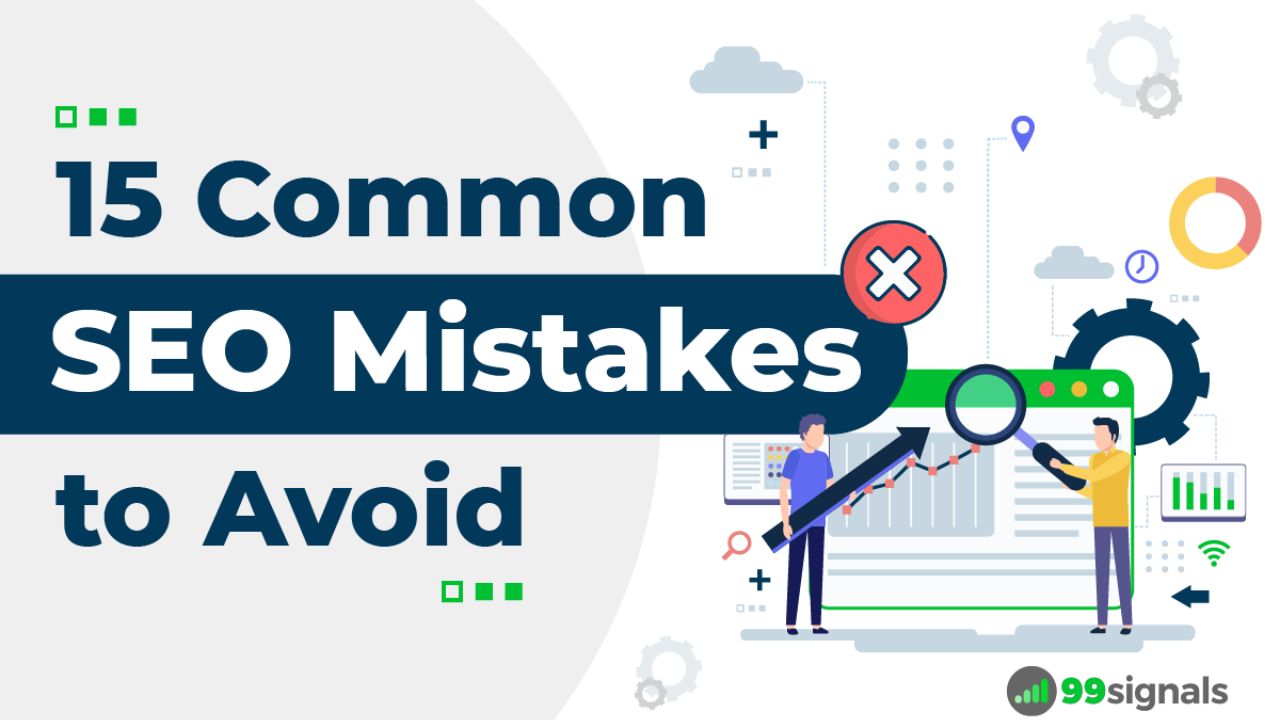Technology
Commercial CCTV for Business Premises: Top Insights

Businesses of all sizes prioritise security nowadays. Investment in protection gives people peace of mind as well as protection of personnel, assets, and sensitive data. CCTV is one of the most effective and widely utilised tools for this. Commercial CCTV is recognised for preventing crime, but its application in companies has expanded. High-tech surveillance systems assist organisations make the workplace safer, monitor activities, reduce liability, and obey the regulations.
The Evolution of CCTV in the Commercial Sector
Commercial CCTV has improved well beyond its black-and-white footage. CCTV systems are more modern and provide real-time information thanks to digital technology, HD recording, cloud storage, and smart analytics. Remote access, face recognition, motion detection, and AI-powered threat analysis are now available to businesses. Companies now view CCTV as a proactive management tool rather than a reactive security measure. A well-planned commercial CCTV installation enhances security and provides peace of mind for business owners.
Why CCTV is Crucial for Business Premises
There are several reasons businesses should install CCTV. First and foremost, it deters criminality. Intruders, vandals, and thieves are less likely to target properties with cameras. Retail, hotel, and logistics organisations that handle high-value goods or cash benefit from this protection method. CCTV helps with corporate issues like policy violations and staff misbehaviour by providing neutral evidence. CCTV footage is reliable for investigations, insurance claims, and legal proceedings if something awful happens.
Enhancing Workplace Safety and Employee Confidence
Security is another benefit of CCTV in organisations. Entrances, parking lots, loading bays, and production floors with strategically placed cameras help workers feel safe. Businesses operating late or in high-security areas need this. CCTV cameras can also ensure health and safety. Managers can check warehouse or factory video footage for safety violations and areas for improvement. Finally, workers are safer, more productive, and more confident.
The Role of CCTV in Operational Oversight
Businesses now realise that CCTV cameras assist, manage operations and keep people safe. Managers may use security camera footage to monitor job flow, customer service, and productivity. Looking at shop footage may show you how consumers behave, when the store is busiest, and where traffic bottlenecks are probable. CCTV can also ensure proper handling and timely logistics loading and unloading. Monitoring and other management measures may boost efficiency and reduce waste for businesses.
Choosing the Right CCTV System for Business Premises
Businesses must carefully consider many factors when purchasing a CCTV system. The right strategy relies on building size, layout, risk, and requirements. Large buildings or multi-location corporations often prefer networked systems with remote monitoring. If they have night vision and HD recording, standalone systems may work for smaller businesses. Many organisations use cloud-based solutions to safely access video from anywhere, which is flexible and handy. Skilled installation and maintenance are also essential for reliability and performance.
Integrating CCTV with Broader Security Systems
CCTV works best as part of a business’s security system. CCTV may be used with alarm, access control, and perimeter security to provide total security. To record events clearly, cameras may be programmed to automatically concentrate on the alarm site. Access control systems may be coupled to CCTV to track who arrives and departs, documenting all property activity. Tiering security may give businesses the most protection and the fewest flaws.
The Future of Commercial CCTV
AI and smart technology will likely change business CCTV. Smart analytics allow systems to distinguish between normal and abnormal behaviour, reducing false warnings. More companies of all sizes can employ heat mapping, face recognition, and object tracking. Cloud storage and 5G connections will make surveillance systems more flexible and accessible, enabling seamless monitoring of several locations. CCTV will make things safer and provide businesses more information about how they work and how consumers respond as technology improves.
Conclusion
CCTV is essential for business owners. Its uses range from employee security and criminal prevention to operations optimization and compliance. The actual value of CCTV is choosing the right system, utilising it appropriately, and integrating it into a security and management plan. By doing this, businesses may convert CCTV from a simple monitoring tool into a tool that boosts safety, trust, and productivity. Commercial CCTV is one of the finest investments a company can make since threats and problems change.
Visit woolrec for more informative blogs.
Technology
Multiple Face Swap: The Future of Creative Video Editing

In the age of digital content, creative video editing has evolved beyond simple cuts and transitions. One of the most exciting innovations in this field is face swap technology, particularly multiple face swap capabilities. This technology allows users to replace faces in videos seamlessly, creating fun, engaging, or even professional content with minimal technical skills. From social media trends to entertainment and marketing campaigns, face swap videos are rapidly gaining popularity.
What is Face Swap Technology?
Face swap is a type of artificial intelligence (AI) technology that maps one person’s face onto another in images or videos. Initially, this technology was limited to photos, requiring advanced editing software and hours of manual work. However, modern AI-driven tools have made face swap video online free services accessible to everyone. These tools automatically detect faces in a video and swap them with the chosen face in real-time or after processing, making it fast and user-friendly.
How Multiple Face Swap Works
The term multiple face swap refers to the ability to swap more than one face within a single video simultaneously. For example, a group of friends in a short clip can each have their faces swapped with celebrities, fictional characters, or even each other. This is achieved using advanced facial recognition algorithms that:
- Detect all faces in the video.
- Map facial features accurately.
- Replace the faces while maintaining expressions and movements.
The result is a realistic-looking video that appears as if the subjects are someone else entirely, often indistinguishable from a professional production.
Popular Uses of Multiple Face Swap
- Entertainment and Social Media:
One of the primary uses of face swap technology is creating entertaining content for social media platforms. Users swap faces in popular movie clips, viral videos, or personal recordings to produce humorous or engaging content that can quickly go viral. - Marketing Campaigns:
Brands increasingly use face swap videos to personalize advertisements. For instance, a brand might allow users to place their faces in an ad campaign, creating a sense of involvement and boosting engagement. Multiple face swaps make it possible to include entire groups of people, enhancing the interactive experience. - Content Creation for Memes and Challenges:
Face swap challenges have become a trend on platforms like TikTok and Instagram. Users create videos by swapping faces with friends, celebrities, or fictional characters, producing entertaining and shareable content. Multiple face swaps allow entire groups to participate, making the content even more dynamic.
Benefits of Using Face Swap Videos Online Free
- Accessibility: Free online tools remove the need for expensive software or editing skills.
- Speed: AI-powered platforms process videos quickly, sometimes in just a few minutes.
- Creativity: Users can experiment with multiple combinations of faces, expressions, and settings.
- Privacy: Many tools allow processing locally or with secure cloud options, ensuring that personal videos remain private.
Choosing the Right Face Swap Tool
When selecting a face swap video online free tool, consider:
- Accuracy: Look for tools that maintain facial expressions, lighting, and skin tones naturally.
- Multiple Face Capability: Ensure the platform supports swapping more than one face at a time.
- Ease of Use: A user-friendly interface saves time and makes the editing process enjoyable.
- Export Options: Check if the tool allows saving in high resolution or directly sharing on social media.
Future of Face Swap Technology
The potential of multiple face swap technology is vast. As AI algorithms continue to improve, the results will become more realistic, enabling uses in:
- Virtual production in films and TV shows
- Personalized advertising at scale
- Interactive gaming experiences
- Educational and training videos
Moreover, ethical and responsible usage will become increasingly important. Platforms and creators are beginning to include safeguards against misuse, ensuring that face swap technology is used for fun, creative, and professional purposes without infringing on privacy or spreading misinformation.
Conclusion
Multiple face swap technology represents a fascinating intersection of AI, creativity, and accessibility. With the rise of face swap video online free tools, anyone can create engaging, professional-looking videos without extensive technical knowledge. From entertainment and social media to marketing and content creation, the possibilities are limitless. By embracing this technology responsibly, users can transform the way they produce and consume video content, making the digital experience more interactive and enjoyable than ever.
Blog
The Risk Adjustment Coding Productivity Trap (And Why Speed Is Killing Your Accuracy)

Every risk adjustment coding manager faces the same pressure. Your team needs to review more charts. Deadlines are looming. The backlog keeps growing. So you push for productivity. Charts per day per coder becomes the metric that matters most.
Then you get hit with audit findings. Or your internal QA discovers systematic errors. Or CMS questions your submission. And you realize that prioritizing speed over accuracy just created a much more expensive problem than the backlog you were trying to solve.
The Charts Per Day Obsession
Most risk adjustment coding teams track productivity in charts per day. Ten charts per coder is slow. Twenty is good. Thirty is excellent. Managers push teams toward higher numbers because more charts reviewed means more HCCs captured.
This makes sense until you understand what happens at high volume. Coders start taking shortcuts. They spend less time verifying MEAT criteria. They code based on problem lists instead of actual encounter documentation. They skip charts that require careful review and cherry-pick the easy ones.
The productivity numbers look great. The error rate is invisible until QA catches it or an audit reveals it months later.
I’ve seen coding teams that process 25 charts per day with 20% error rates and teams that process 12 charts per day with 3% error rates. The slower team is creating more defensible value, but they look less productive on the surface metrics.
The Complexity Problem
Not all charts are equal. A straightforward annual wellness visit for a healthy patient takes ten minutes to code. A complex hospital discharge with 30 diagnoses and incomplete documentation might take an hour to code properly.
When you measure coders purely on charts per day, you’re incentivizing them to avoid the complex charts. Those are the charts that often have the most HCC value, but they’re also the ones that drag down productivity metrics.
Smart coders learn to game the system. They grab the easy charts first. The complex ones sit in the queue until someone is forced to review them under time pressure, which is when mistakes happen.
Better approach: measure by documentation complexity, not just volume. A coder who handles five complex hospital charts might be more productive than a coder who processes fifteen routine office visits, even though the raw numbers suggest otherwise.
The Quality-Speed Tradeoff
There’s a direct relationship between coding speed and coding accuracy. Up to a point, experienced coders can work quickly without sacrificing quality. They recognize patterns, they know what to look for, they make good decisions efficiently.
But past that point, every additional chart comes at the cost of accuracy. Coders get fatigued. They start making assumptions instead of verifying. They miss subtleties in documentation that matter for MEAT criteria.
The problem is that every coder’s threshold is different. Some can maintain quality at 20 charts per day. Others start making errors at 15. When you set organization-wide productivity targets, you’re pushing some coders past their quality threshold.
Instead of uniform productivity goals, calibrate expectations to individual coder capabilities. Some coders should handle high volumes of straightforward cases. Others should focus on complex cases that require more attention. Match the work to the coder’s strengths.
What Good Risk Adjustment Coding Looks Like
Good risk adjustment coding prioritizes defensibility over volume. Coders take the time to verify that documentation actually supports the codes they’re assigning. They query providers when MEAT criteria is ambiguous instead of guessing. They document their coding rationale so that if the chart is audited years later, the evidence trail is clear.
This is slower than coding based on hunches and assumptions. But it’s infinitely better when CMS auditors show up.
Good coding also involves actually reading the clinical documentation, not just scanning for diagnosis keywords. A coder who reads the full encounter note will catch context that changes coding decisions. A coder who’s skimming for efficiency will miss it.
The Metrics That Actually Matter
Stop measuring charts per day as your primary metric. Start measuring these instead.
Coding accuracy rate from QA review. What percentage of coded charts survive internal audit without errors? If accuracy is below 95%, your quality controls aren’t working regardless of volume.
Audit defensibility rate. When you simulate RADV audits internally, what percentage of codes have clear, documented MEAT criteria? This predicts how you’ll perform in real audits.
HCC capture rate improvement. Are you finding conditions that would’ve been missed otherwise? Volume means nothing if you’re just validating codes that were already being captured.
Query effectiveness. How many provider queries result in documentation clarification versus no response? Good coders query strategically when needed.
These metrics tell you if your coding operation is creating value or just creating activity.
Finding the Right Balance
You need reasonable productivity from your risk adjustment coding team. Charts can’t sit in queues forever. Deadlines matter. But productivity at the expense of accuracy is false economy.
The right balance depends on your risk tolerance. If you’re terrified of RADV audits, prioritize accuracy and accept lower volume. If you’re comfortable with more risk and have strong QA processes to catch errors, you can push for higher productivity.
Most organizations should target 15-20 charts per day for experienced coders handling typical complexity. Build in time for QA, documentation, and query management. Accept that complex cases take longer and adjust expectations accordingly.
And stop celebrating productivity improvements that come from cutting corners. Fast coding that creates audit liabilities isn’t productive. It’s expensive.
Technology
RepMold: How is Transforming Product Design and Prototyping

In the fast-paced world of product development, getting it right from the start is crucial. Product design and prototyping can make or break a new idea. This is where RepMold steps in to revolutionize the way designers and engineers approach their projects. Imagine being able to create intricate prototypes quickly and efficiently, allowing for rapid iterations without breaking the bank. That’s what RepMold offers—a cutting-edge solution that combines innovation with practicality. Dive into this blog post as we explore how RepMold is transforming product design and prototyping, making dreams tangible faster than ever before.
The Importance of Product Design and Prototyping
Product design and prototyping are the backbone of successful innovation. They provide a critical pathway from concept to reality, ensuring that ideas take shape in a functional way.
Effective product design focuses on user needs, aesthetics, and functionality. It’s about creating an experience that resonates with customers while solving real problems.
Prototyping plays an equally vital role by allowing designers to visualize their concepts before committing to production. This phase is where creativity meets practicality; it helps identify potential flaws early on.
Rapid iterations during the prototyping stage can lead to better products. Designers can refine features based on feedback, ultimately enhancing usability and market fit.
In today’s competitive landscape, investing time in thoughtful design and effective prototyping is essential for any business aiming for success. A well-designed product not only attracts attention but also builds trust with consumers who seek quality and reliability.
What is RepMold and How Does it Work?
RepMold is an innovative technology reshaping the landscape of product design and prototyping. At its core, it leverages advanced materials and automated processes to create high-quality molds quickly.
The system operates by utilizing digital models generated from CAD software. These designs are transformed into physical prototypes through a streamlined production process that reduces time and cost significantly.
Users feed their specifications into RepMold’s platform, which translates them into precise mold structures. This automation minimizes human error while maximizing efficiency.
With a focus on versatility, RepMold accommodates various materials, making it suitable for different industries—from consumer products to automotive components. This flexibility allows designers to iterate rapidly without the typical constraints associated with traditional prototyping methods.
Advantages of Using RepMold for Product Design
RepMold offers a transformative approach to product design that many industries are catching onto. One of its key advantages is speed. Designers can create prototypes in record time, allowing for rapid iterations and adjustments based on feedback.
Cost-effectiveness is another significant benefit. Traditional prototyping methods often require substantial investment in materials and labor. RepMold streamlines this process, reducing expenses while maintaining high-quality outputs.
The flexibility of RepMold stands out as well. It accommodates various materials and designs, making it adaptable to diverse projects across different sectors—from automotive to consumer goods.
Collaboration becomes simpler too. Teams can easily share digital models with stakeholders worldwide for input or approval before moving into production stages. This fosters creativity and innovation while minimizing misunderstandings throughout the design process.
With these advantages, it’s evident why so many companies are embracing RepMold as an essential tool in their product development arsenal.
Success Stories of Companies Using RepMold
Several companies have harnessed the power of RepMold to revolutionize their product design processes. One notable example is a leading consumer electronics firm that reduced its prototyping time by over 50%. This efficiency allowed for rapid iterations and quicker market entry.
Another success story comes from an automotive manufacturer. By utilizing RepMold, they created intricate parts with complex geometries that were once impossible to produce. The result was not only enhanced performance but also significant cost savings in materials.
Startup businesses are also benefiting from this innovative technology. A small designer brand leveraged RepMold to create customized products tailored to clients’ needs, boosting customer satisfaction and loyalty significantly.
These examples highlight how diverse industries can adapt RepMold’s capabilities, driving innovation and enhancing competitiveness in today’s fast-paced market.
Challenges and Limitations of RepMold
While RepMold offers innovative solutions, it’s not without its challenges. One significant limitation is the initial setup cost. For small businesses or startups, investing in this technology can be a substantial financial burden.
Moreover, the learning curve associated with using RepMold software may deter some users. Mastering new tools requires time and training. This might slow down the design process for teams already under tight deadlines.
Material compatibility also poses a challenge. Not all materials work seamlessly with RepMold’s system, which can limit options for designers looking to experiment or innovate.
While rapid prototyping speeds up product development, it can sometimes lead to overlooking finer details in favor of speed. Balancing efficiency and quality remains a critical concern in adopting this technology effectively.
The Future of Product Design with RepMold
The future of product design is set to evolve dramatically with RepMold at the forefront. As technology advances, designers will increasingly rely on RepMold’s capabilities for rapid prototyping and innovative solutions.
With its user-friendly interface, even those new to product design can create prototypes efficiently. This democratization of design empowers more individuals and teams to bring their ideas to life without extensive technical training.
Moreover, as sustainability becomes a priority, RepMold’s materials are designed with eco-friendliness in mind. The reduced waste during the prototyping phase supports greener practices across industries.
Collaboration will also see a shift. Teams around the globe can work simultaneously on designs through cloud-based platforms integrated with RepMold. This connectivity fosters creativity and accelerates project timelines significantly.
As we embrace these advancements, the potential for groundbreaking products expands exponentially, opening doors that were previously unimaginable.
Conclusion
The landscape of product design and prototyping is rapidly changing, with RepMold leading the charge. By streamlining the design process and reducing time-to-market, it empowers businesses to innovate faster than ever before. This technology not only enhances creativity but also increases efficiency in developing prototypes that meet market demands.
As more companies adopt RepMold into their workflows, we can expect to see a transformation in how products are conceived and brought to life. The blend of advanced materials and intelligent design techniques provides endless possibilities for industries ranging from automotive to consumer electronics.
While challenges remain—such as initial costs or learning curves—the benefits far outweigh these hurdles for many organizations. Embracing this technology positions companies at the forefront of innovation.
RepMold represents a shift towards smarter, more efficient product development processes that could redefine industry standards for years to come. As we look ahead, it’s clear that those who leverage such cutting-edge tools will be best equipped for success in an increasingly competitive marketplace.
Technology
Understanding Lip Sync AI and Image to Video AI: How AI Is Changing Video Creation

Video content has become a major part of how we communicate, teach, and entertain. Creating high-quality videos, however, often requires significant time and effort. That is where technologies like lip sync AI and image to video AI make a difference. These tools help bring ideas to life in videos more quickly, while still maintaining a natural and realistic feel. In this article, we will explore what these technologies are, how they work, and why they are becoming increasingly important.
What Is Lip Sync AI?
Lip sync AI is an artificial intelligence technology that aligns mouth movements with spoken audio. Essentially, it can make a person or an avatar’s lips move naturally in sync with any voice or sound.
How Lip Sync AI Works
The technology relies on machine learning algorithms that have analyzed thousands of videos showing how lips, teeth, and tongue move when speaking. Using this data, the AI can predict how the mouth should move for new audio clips. This allows videos to have realistic lip movements without requiring frame-by-frame manual editing.
Applications of Lip Sync AI
Lip sync AI is commonly used in educational videos to match voice overs, in animated storytelling, and in tutorials or presentations. It is particularly useful for creating content where the synchronization of speech and visuals is important.
For more details on how this technology works, you can explore lip sync AI.
What Is Image to Video AI?
Image to video AI is a technology that transforms static images into dynamic, moving visuals. The AI analyzes a photo or illustration and predicts natural movements, often combining them with audio or background effects.
Applications of Lip Sync AI
Lip sync AI is commonly used in educational videos to match voice overs, in animated storytelling, and in tutorials or presentations. It is particularly useful for creating content where the synchronization of speech and visuals is important.
For more details on how this technology works, you can explore lip sync AI.
What Is Image to Video AI?
Image to video AI is a technology that transforms static images into dynamic, moving visuals. The AI analyzes a photo or illustration and predicts natural movements, often combining them with audio or background effects.
How Image to Video AI Works
First, you start by uploading a static image, which could be a portrait, illustration, or any other visual. The AI then detects key features like faces or objects and creates realistic movement for them. Audio or music can be added, and the AI synchronizes it with the animation. Finally, the video can be exported in a format suitable for social media, presentations, or other platforms.
This technology makes it possible to turn simple images into engaging videos, allowing even people without advanced editing skills to create compelling visual content.
You can find more information about this process with image to video AI.
Benefits of These Technologies
Even in an educational or informational context, it helps to understand why lip sync AI and image to video AI are significant.
Creating videos with AI saves time because tasks like animating mouths and objects, syncing audio, and adding motion effects are automated. These tools also make video creation more accessible to people without professional editing experience. They encourage creative experimentation, allowing users to try different storytelling techniques, facial expressions, and animations. In education, animated content can help explain concepts more clearly and keep viewers engaged.
Practical Examples
These technologies have a variety of real-world applications. Teachers can animate diagrams or create lessons with dynamic visuals. Content creators can produce short, expressive social media videos. Historical photos or artwork can be brought to life, and hobbyists can explore creative storytelling in ways that were previously difficult or time-consuming.
These examples highlight that lip sync AI and image to video AI are not only tools for entertainment or marketing but also for learning, creativity, and communication.
Limitations and Considerations
Although these tools are impressive, there are some important points to keep in mind. The accuracy of lip-syncing can vary, especially with uncommon words, accents, or fast speech. Ethical considerations are important because using someone’s image or voice without permission can be problematic. Some high-quality animations may require stronger hardware or cloud services. Finally, AI may not always capture the artistic intent perfectly, so human oversight is still necessary.
The Future of AI in Video Creation
AI-driven video tools continue to evolve, becoming more realistic and intuitive. Future developments could include even more expressive animations, integration with virtual and augmented reality, collaborative content creation tools, and broader adoption in education, art, and communication. These advancements will make video creation faster, more creative, and more accessible to a wider range of users.
Conclusion
Lip sync AI and image to video AI are transforming the way videos are created. They make the process faster, open up new creative possibilities, and allow a wide range of people to produce visually engaging content. By understanding how these technologies work, their applications, and their limitations, anyone can start exploring ways to bring static images and audio to life in videos that are both natural and compelling.
Technology
DIY SEO Mistakes Melbourne Business Owners Keep Making

Melbourne hums with ambition. Cafés multiply across laneways, boutiques appear on quiet corners, and small agencies chase digital relevance. Many owners decide to handle their own SEO because budgets feel tight. The internet seems manageable, but then the problems start. The same avoidable mistakes appear again.
The list below highlights those missteps with clarity. Read them, understand them, and make sure not to repeat them, as SEO experts in Melbourne suggest.
Mistake 1: Ignoring Local Intent
Many business owners chase broad keywords. “Best coffee,” “top barber,” or “wedding florist” attract attention. Those keywords lack location signals.
Melbourne search behaviour demands suburb relevance. For instance, Carlton produces different queries from Frankston, and Fitzroy differs from Sunbury. Generic targeting weakens performance. Google ignores pages without geographic accuracy, so the result stays invisible.
Mistake 2: Poor Google Business Profiles
Some owners open a Google Business Profile, then forget to refine it. So, avoid the below mistake:
- Blank service areas linger.
- Old addresses remain.
- Missing photos leave empty frames.
- Incorrect hours confuse visitors.
- Unverified listings drop trust.
- Reviews gather dust.
- Responses never appear.
Algorithms punish negligence. Competing businesses occupy map packs instead. Local customers follow the better presented profile.
Mistake 3: Copy-Paste Descriptions
DIY enthusiasts grab text from rival websites or old brochures. Plagiarised content poisons rankings, as search engines detect repetition immediately. Such duplicate phrasing creates penalties. Eventually, pages sink into digital obscurity.
A unique voice strengthens authority, while unoriginal lines damage it. Many owners underestimate this risk but it deserves special attention.
Mistake 4: Overlooking Mobile Users
Melbourne residents favour phones during commutes, queues, and tram rides. But websites often load slowly on small screens, buttons shrink to ant size, fonts blur, images overflow, and so on. This is primarily because DIY websites ignore responsive design. Google notices every flaw and rankings decline. Users abandon pages swiftly. Bounce rate climbs without mercy.
Melbourne hums with ambition. Cafés multiply across laneways, boutiques appear on quiet corners, and small agencies chase digital relevance. Many owners decide to handle their own SEO because budgets feel tight. The internet seems manageable, but then the problems start. The same avoidable mistakes appear again.
The list below highlights those missteps with clarity. Read them, understand them, and make sure not to repeat them, as SEO experts in Melbourne suggest.
Mistake 1: Ignoring Local Intent
Many business owners chase broad keywords. “Best coffee,” “top barber,” or “wedding florist” attract attention. Those keywords lack location signals.
Melbourne search behaviour demands suburb relevance. For instance, Carlton produces different queries from Frankston, and Fitzroy differs from Sunbury. Generic targeting weakens performance. Google ignores pages without geographic accuracy, so the result stays invisible.
Mistake 2: Poor Google Business Profiles
Some owners open a Google Business Profile, then forget to refine it. So, avoid the below mistake:
- Blank service areas linger.
- Old addresses remain.
- Missing photos leave empty frames.
- Incorrect hours confuse visitors.
- Unverified listings drop trust.
- Reviews gather dust.
- Responses never appear.
Algorithms punish negligence. Competing businesses occupy map packs instead. Local customers follow the better presented profile.
Mistake 3: Copy-Paste Descriptions
DIY enthusiasts grab text from rival websites or old brochures. Plagiarised content poisons rankings, as search engines detect repetition immediately. Such duplicate phrasing creates penalties. Eventually, pages sink into digital obscurity.
A unique voice strengthens authority, while unoriginal lines damage it. Many owners underestimate this risk but it deserves special attention.
Mistake 4: Overlooking Mobile Users
Melbourne residents favour phones during commutes, queues, and tram rides. But websites often load slowly on small screens, buttons shrink to ant size, fonts blur, images overflow, and so on. This is primarily because DIY websites ignore responsive design. Google notices every flaw and rankings decline. Users abandon pages swiftly. Bounce rate climbs without mercy.
So, remember that mobile performance decides success.
Mistake 5: Stuffing Keywords Everywhere
Old SEO myths still circulate. Some owners sprinkle keywords recklessly. This turns sentences robotic and paragraphs read like spam. Pages repeat “Melbourne plumber” twenty times, pushing search engines to penalise keyword cramming. This makes visitors flee after two lines.
Relevance requires natural language. DIY attempts wreck the flow.
Mistake 6: Weak Title Tags
Title tags operate like digital labels. Many owners leave generic placeholders but “Home” or “Welcome” appear on multiple pages. Algorithms dislike bland tags. Users skip vague titles on result pages. Optimised tags require focus. DIY efforts forget that influence. Valuable clicks move elsewhere.
Mistake 7: No Meta Descriptions
Countless websites ignore meta descriptions. Google then fills the gap with random text snippets. Then, the result looks clumsy and users hesitate. But clear summaries attract clicks. Competing pages gain advantage instantly.
Mistake 8: Broken Internal Links
Website pages often link to outdated URLs. Deleted blogs stay referenced. Location pages vanish without redirection. Visitors hit 404 pages. Search engines interpret those signals as poor maintenance. Rankings suffer. Many DIY owners fail to audit links. Every broken path sabotages visibility.
Mistake 9: Neglecting Image Optimisation
Large images slow everything. Some common mistakes in this aspect include:
- Filenames often read like “IMG_0021.”
- Alt text goes missing.
- DIY creators ignore compression tools.
Then, crawlers skip those images entirely. Speed scores plummet and accessibility disappears. Melbourne customers lose patience with delayed load times.
Mistake 10: Skipping Analytics
SEO progress needs tracking. Many owners install nothing. No Google Analytics. No Search Console. No reporting tools. Performance remains mysterious. Pages could sink without warning. Trends remain invisible. Errors go unnoticed. Data would guide improvement. Instead, assumptions rule decisions.
Mistake 11: Forgetting Backlinks
Links from external sites build credibility. Melbourne blogs, directories, and partners offer opportunities. DIY efforts rarely pursue them because business owners assume content alone attracts links.
Search engines rank pages with authority weight. No links equals no influence. Competitors gain ascendancy through outreach.
Mistake 12: Thin Content Pages
Several websites show three-sentence pages, while service pages hold minimal information. Blog posts barely cover topics. But search engines value depth and reflect that expectation. If that doesn’t happen, rankings will start to.
13: Outdated Information
Businesses evolve, as hours change, products shift, and team members leave. However, DIY websites remain frozen in time. Searchers encounter stale facts. Trust dissolves quickly. In the end, Google demotes useless content.
The solution is to have up-to-date accuracy that boosts reliability. Many owners forget that responsibility.
Mistake 14: Avoiding Schema Markup
Schema markup gives structured clarity to search engines. Rich snippets appear through it. Yet, DIY efforts rarely touch it because code feels intimidating. Opportunities vanish as a result. Competitors highlight reviews, products, or FAQs with enhanced results. DIY pages look plain and forgotten.
Mistake 15: Slow Hosting Plans
Discount hosting attracts many small business owners, but cheap servers produce sluggish performance. For instance, high traffic creates jams and security holes appear. Also, Melbourne users expect speed, and search engines do as well.
DIY decisions often sacrifice quality for cost. This lets Search rankings suffer each time.
Final Word
Awareness marks the first turning point. Every misstep listed here can be fixed. Websites can evolve, content can shine, and local customers can discover the right business at the right moment. If you want to steer clear of these mistakes (and possibly more), recognise the importance of working with an SEO expert in Melbourne. Make My Website is one of the best names we suggest. Check them out, discuss your needs, and see how you can collaborate for better results.
Good luck!
Technology
Calamariere: Redefining the Future of Digital Innovation

In a rapidly changing online world, innovation has become the key to success. Today, creators and businesses are constantly seeking smarter platforms that can enhance their productivity and creativity. One such emerging name is Calamariere. This advanced digital platform is gaining global attention for blending intelligent technology with modern collaboration tools.
From artificial intelligence to real-time teamwork, Calamariere offers a unified space where ideas transform into reality. In this article, we’ll explore how Calamariere works, what makes it unique, and why it is shaping the future of online innovation.
What Is Calamariere?
Simply put, Calamariere is an all-in-one digital workspace that helps creators, entrepreneurs, and teams collaborate more effectively. Instead of switching between multiple tools, users can manage everything within a single platform. As a result, productivity improves while creativity remains at the forefront.
Unlike traditional project management software, Calamariere integrates AI-driven features, real-time data tracking, and seamless communication channels. Therefore, users can brainstorm, build, and publish projects without interruptions.
The Purpose Behind Calamariere
The mission behind Calamariere is simple yet powerful to simplify digital creation while fostering innovation. In today’s world, professionals often waste time navigating between apps and tools. Consequently, this fragmentation slows progress and reduces efficiency.
To solve this issue, the creators of Calamariere envisioned a flexible and intelligent ecosystem. Their goal was to design a platform that could adapt to different users designers, marketers, developers, and educators alike. Moreover, they wanted to make advanced technology accessible to everyone, not just tech experts.
Key Features of Calamariere
Calamariere stands out for its range of forward-thinking features. Each function is designed with usability, collaboration, and creativity in mind. Let’s explore some of the most notable ones below.
1. Unified Digital Workspace
With Calamariere, everything you need is available in one place. This not only reduces distractions but also saves time. Furthermore, the platform’s user-friendly interface ensures a smooth experience for beginners and professionals alike.
2. AI-Enhanced Productivity Tools
Artificial intelligence powers many of Calamariere’s core features. For instance, it can automate repetitive tasks, generate content suggestions, and even analyze performance trends. Consequently, users can focus more on creativity and strategy instead of manual work.
3. Real-Time Collaboration
Teams can collaborate in real time, which makes Calamariere perfect for remote work. Multiple people can edit, comment, and update projects simultaneously. In addition, built-in communication tools help reduce dependency on external apps like Slack or Zoom.
4. Secure Cloud Integration
Security remains a top priority for Calamariere. All projects and files are stored in encrypted cloud servers with automatic backups. Therefore, users can work confidently knowing their data is safe and always accessible.
5. Advanced Analytics and Insights
Data-driven decision-making is now easier than ever. Calamariere includes advanced analytics dashboards that display engagement metrics, performance reports, and workflow summaries. As a result, users can refine their strategies using real data.
Why Calamariere Is Gaining Popularity in 2025
There are countless digital tools on the market, but Calamariere is quickly standing out. One reason for its popularity is its balance between simplicity and intelligence. While many platforms are either too complex or too limited, Calamariere offers the best of both worlds.
Additionally, the platform encourages community collaboration. Users can share resources, exchange feedback, and even collaborate across projects. This growing network makes Calamariere not only a tool but also a vibrant ecosystem for creators.
Moreover, its continuous updates ensure the platform stays relevant. In 2025, when innovation drives competition, Calamariere continues to evolve with new AI integrations and improved user experiences.
Benefits of Using Calamariere
The benefits of Calamariere extend far beyond convenience. By centralizing creativity, communication, and analytics, it delivers measurable results. Let’s look at some key advantages.
1. Time Efficiency
Thanks to its automation features, Calamariere reduces repetitive manual work. As a result, projects move faster from planning to execution. This efficiency is especially valuable for teams handling multiple deadlines.
2. Enhanced Collaboration
Unlike traditional tools, Calamariere enables real-time teamwork regardless of distance. Therefore, it bridges the gap between remote employees, clients, and creative partners.
3. Improved Creativity
The AI-powered recommendations and customizable templates in Calamariere inspire users to experiment. Furthermore, flexible design options give creators the freedom to innovate without limits.
4. Cost Savings
Because Calamariere combines multiple tools into one, users can cancel redundant subscriptions. This makes it not only efficient but also cost-effective particularly for small businesses and startups.
5. Reliable Security
With strong encryption and secure cloud servers, Calamariere ensures that every file remains protected. Moreover, automatic backups prevent data loss in case of system errors.
How Calamariere Stands Out from Its Competitors
While several digital platforms claim to enhance productivity, Calamariere distinguishes itself through its adaptability and personalization. Unlike one-size-fits-all software, it adjusts to the unique needs of every user.
In addition, its AI engine learns from user behavior. Over time, Calamariere becomes more intuitive, suggesting faster workflows and smarter automation. Therefore, it doesn’t just assist it evolves alongside its users.
Furthermore, the platform integrates smoothly with other digital tools such as Google Workspace, Trello, and Notion. This compatibility allows users to build a connected, customized workflow with minimal disruption.
The Future of Calamariere
The future looks bright for Calamariere, as it continues to innovate with cutting-edge technology. Developers are already working on integrating machine learning, VR environments, and blockchain verification into future updates.
Consequently, Calamariere is expected to expand beyond creative industries and into areas like education, remote training, and digital marketing. As the digital economy grows, platforms like Calamariere will play a crucial role in shaping how people work and connect online.
Why You Should Try Calamariere Today
If you’re seeking a digital solution that simplifies your workflow while inspiring creativity, Calamariere is worth exploring. It offers an intuitive experience, whether you’re a freelancer, business owner, or creative team.
Moreover, its combination of AI intelligence, collaboration tools, and data security makes it one of the most promising platforms of 2025. With Calamariere, you can work smarter, collaborate better, and innovate faster all within a single ecosystem.
Final Thoughts
In conclusion, Calamariere is more than just another digital platform it’s a revolution in online productivity and creativity. It empowers users to think differently, work efficiently, and grow continuously.
As technology evolves, tools like Calamariere remind us that innovation is not about complexity it’s about making life simpler, smarter, and more connected. Therefore, embracing Calamariere today could be the key to staying ahead in tomorrow’s digital world.
Technology
How Social Media Experts Drive Growth for Small Businesses

Businesses of all sizes may effectively contact prospects and consumers through social media communication. Social media is where people find, research, follow, and purchase from organizations, so if you’re not active on sites like Facebook, Instagram, and LinkedIn, you’re losing out! Through focused campaigns, innovative content, and successful methods, the team of social media experts in Pakistan assists businesses in expanding their online presence. Effective social media marketing can help your company achieve amazing success by generating loyal brand supporters and even increasing leads and revenues.
- This comprehensive guide to social networking management will teach you:
- An explanation of social media marketing, including statistics, advantages, and advice.
- How to create a plan to implement a strategy for marketing on social media.
- How to use the top seven social media platforms for advertising.
Select The Appropriate Networks
Since Facebook went public in 2012, social media has taken off, with several thousand networks devoted to a wide range of topics, from social activism to reuniting former classmates.
How does an organization choose the best options out of all of these? The majority of experts advise joining the most well-liked ones; which ones to choose depends on your audience and objectives. Here are some details to get you going:
- Facebook, the largest platform with 2.1 billion monthly active users, according to Statista, is ideal for companies seeking to establish relationships and generate leads.
- LinkedIn is a business networking site that both B2B and B2C companies may utilize to engage audiences, establish authority, and foster trust.
- X: Its immediacy platform is ideal for companies that need to keep up with time-sensitive information, such as announcements, breaking news, and subjects that are popular, and whose primary audience is under 50.
- For businesses with a visual attractiveness (think restaurants, fashion, art, vacations, and weddings), Pinterest is an excellent venue for promoting their content.
Social Media Marketing Advantages
Social media represents one of the best free ways to sell your business these days because of its extensive use and adaptability. The following are some particular advantages of social networking marketing:
- Humanize your company: You may use social media to make your company an active player in your market. Your audience may get to know, relate to, and trust your friendly persona through your posts, communication with users, and profile.
- Drive traffic: Social networking is a great way to get more people to visit your website, where you can turn them into clients, thanks to the links in your profile, your blog articles, and advertisements. Additionally, social signals play a role in SEO indirectly.
Businesses Can Learn More About Their Customers
Finding those who are important to you and getting to know their needs, wants, and experiences is the first, along with the most evident, advantage. Online users are frequently more open to discussing their experiences and more responsive to brands and items.
Examine the social media accounts of your competitors to find out more about your clients and potential clients. Visit groups where people talk about your niche as well. For instance, look for Facebook gardening communities and see what subjects individuals are talking about to generate content to put on your gardening website.
Create Leads And Customers:
With features like Instagram/Facebook shops, personalized messages, buttons with calls to action on profiles, and appointment scheduling tools, you can also create prospective clients and convert them directly on these platforms.
Boost brand awareness:
Social media platforms’ visual format enables you to establish your visual identity in front of large audiences and raise brand recognition. Additionally, increased brand recognition translates into improved outcomes for all of your other efforts.
Client Confidence
Through the development of genuine, personal connections that go beyond the bounds of conventional marketing, social media revolutionizes the way small businesses gain the trust of their clients. Social media platforms give business owners the opportunity to share their personalities, values, and behind-the-scenes activities with clients, which helps them feel more connected to the brand than impersonal advertising methods. Small businesses exhibit transparency and accessibility that larger firms frequently find difficult to attain when they share their story, personally answer comments, and have genuine interactions.
Overcoming The Cacophony Of Advertisements
Social media is just one of several platforms where people are constantly exposed to advertisements. That is an issue if advertisements are the only marketing strategy used by your small firm.
According to experts, “They are seeing consumers show signs of advertisement fatigue in the advertisement world.” “They are continuously inundated with sponsored advertisements while they are browsing the internet, watching their favorite show, paying attention to podcasts, or commuting down the road.”
Customers such as himself “can smell an advertisement that is paid for from a mile away and we often ignore them like the plague,” experts noted. The beneficial news is that your company can get clients more authentically with organic social networking marketing.
How To Open Your Social Media Accounts In Five Easy Steps
You may stimulate your brand’s online social networking presence in a matter of minutes. This is a five-step guide that explains how small businesses can begin social media marketing.
- On your PC or mobile device, go to the social media site of your choice.
- Register and set up a bank account for your business.
- Take ownership of your company’s username.
- Include your bio, website URL, and profile image or logo.
- Post your first article.
See this advice from experts for detailed guidance on how to maximize your social media platforms.
Final Words
The most crucial thing to keep in mind is that social media sites are not a place to pitch your company, on account of the platforms actively use or how you please use them. You can offer helpful information, show off your principles, express your individuality, and uplift others around you in this community.
Visit woolrec for more informative blogs.
Technology
7 Ways a Marketing Agency Drives Customer Loyalty

Every thriving company’s heart is customer loyalty. Though winning fresh customers feels good, growth depends on keeping them. Loyal consumers come back often, suggest brands, and spend more. Reducing the need for continuous fresh leads also helps them to stabilise. Still, it’s not simple to develop that level of devotion. It demands originality, planning, and ongoing effort. A marketing agency Manchester distinguishes itself here.
With knowledge in research, design and digital technologies, marketing agencies enhance client connections at every point of contact. They develop loyalty programs that keep people coming back, experiences that enchant, and campaigns that connect. Working with the appropriate agency transforms first-time purchasers into long-term fans. It’s about ensuring every client feels appreciated on their trip with your brand, not only about deals, but also about trust building.
Creating Personalised Campaigns
People crave to be noticed. Action is no longer motivated by general messages. Marketing firms investigate consumer buying history, interests, and behaviour. Using this information, they create unique, appropriate campaigns. Emails include names, offers reflect previous purchases, and advertisements match browsing activity. This degree of detail makes clients appreciate their value. It shows the brand is attentive and knows. People return more often and participate more when they sense a connection. Personalisation creates emotional links that go beyond simple transactions.
Developing a Distinctive Brand Identity
A robust brand identification is like a familiar face in a swarm. Customers know it at once. With images, tone, and messaging, marketing agencies assist companies in defining that identity. They guarantee ads, social media, and websites all employ the same voice. Consistency builds trust. Customers feel safe when they see the same values repeated everywhere. Agencies also emphasise what distinguishes a brand. This distinctive feature sets companies apart from their rivals. A great identity makes consumers happy to connect with the brand.
Relating Through Social Media
Social media is a dialogue rather than only a platform. Customers want interaction, not one-way sales messages. Marketing agencies employ interactive tools such as polls or Q&A; sessions to craft appealing content and reply promptly. These activities demonstrate to consumers that the brand is listening. They also bring people closer to a community. Agencies design content that starts discussions, not just clicks. These minor contacts help to foster loyalty over time. Customers remain linked since they feel they belong to something bigger.
Delivering Valuable Content
Not only do people search for items, but also for solutions. Through pertinent content, organisations are assisted by agencies in delivering that. Blogs explain, guides educate, and videos inspire. This material helps consumers learn new things or solve issues. Customers see a brand that freely distributes information as a dependable source. They return not only for goods but for counsel as well. This number develops profound confidence over time. Regular consumers realise the company values more than only profit.
Running Loyalty Programs
Rewards show customers how special they are. Loyalty programs created by organisations motivate recurring purchases. Appreciation is indicated through points, special discounts, or early access to goods. These systems generate buzz. With every transaction, clients anticipate rewards. Furthermore, making switching to rival companies less appealing is a strong loyalty program. Agencies arrange these systems meticulously such that they are enjoyable to use and beneficial.
Better Decisions Using Data
Data conveys tales. Agencies gather information about customer purchases, visit frequency, and content interaction. They act on this data. Offers are changed, campaigns are tweaked, and consumer experiences are enhanced. This method guarantees companies avoid wasting time guessing. Every choice is founded on facts. Customers see these changes. They sense the brand is always changing to better meet their demands. Data-driven approaches show care and accuracy that fosters greater trust.
Improving Customer Experience
Experiences that are seamless help to develop loyalty. Agencies concentrate on every phase of the consumer path. They verify the responsiveness of the service, the clarity of the emails, and the user-friendliness of the websites. Customers come back without second thought after a straightforward, uplifting experience. Marketing agencies also look for pain spots that turn people away. Correcting these problems provides long-lasting fulfilment. Brands that value customers’ time and simplify life are remembered.
Adapting to Changing Needs
Customer demands always change. Behaviour is influenced by new trends, technology, or cultural shifts. Marketing agencies keep an eye on these changes and swiftly modify tactics. They present contemporary tools, renew designs, and update campaigns. This flexibility reveals the brand’s contemporary status to consumers. Organisations that change remain current and honest. Customers stay with brands that develop with them rather than trailing off. Long-term dedication is obviously shown in one’s flexibility.
Conclusion
Customer loyalty goes beyond regular purchases. It concerns developing confidence, providing value, and presenting significant experiences. Key participants in this process are marketing agencies. They provide useful content, customise campaigns, and define distinct brand identities. Furthermore, they promote word of mouth, create loyalty programs, and enhance consumer experiences.
Businesses change quickly and meet shifting demands under professional mentorship. A reliable customer base next provides the basis for expansion. Brands may transform customers into lifelong advocates who remain, share, and believe with the appropriate agency.
Visit woolrec for more informative blogs.
-

 Entertainment5 months ago
Entertainment5 months agoOGFap Review: Pros, Cons, and User Experience
-

 Fashion4 months ago
Fashion4 months agoComme des Garcons: The Iconic Avant-Garde Fashion Brand
-

 Blog5 months ago
Blog5 months agoi̇ns: Exploring Its Meaning, Values, and Modern Impact
-

 Uncategorized5 months ago
Uncategorized5 months agoManga18fz: A Complete Guide to the Trending Manga Platform
-

 Blog5 months ago
Blog5 months ago鲁Q 669FD License Plate Lookup – Car History & Vehicle Records
-

 Fashion4 months ago
Fashion4 months agoCustom Jersey Printing: Designing Your Team’s Identity with SeamJersey
-

 Blog4 months ago
Blog4 months agoRuisseau d’Avenelle: A Peaceful Escape into Nature
-

 Life Style4 months ago
Life Style4 months agoThe Ultimate Guide to Halloween Contacts for Eyes: Everything You Need to Transform into Your Darkest Character

